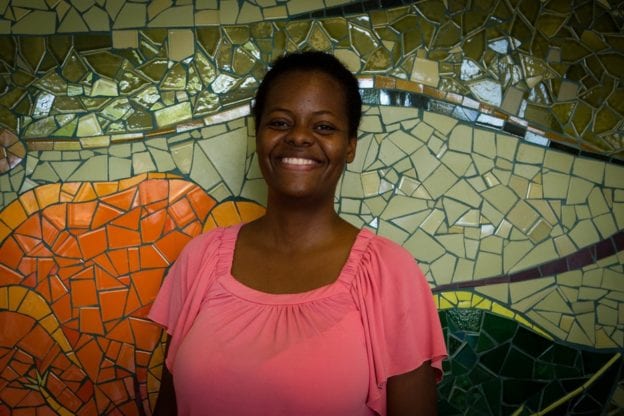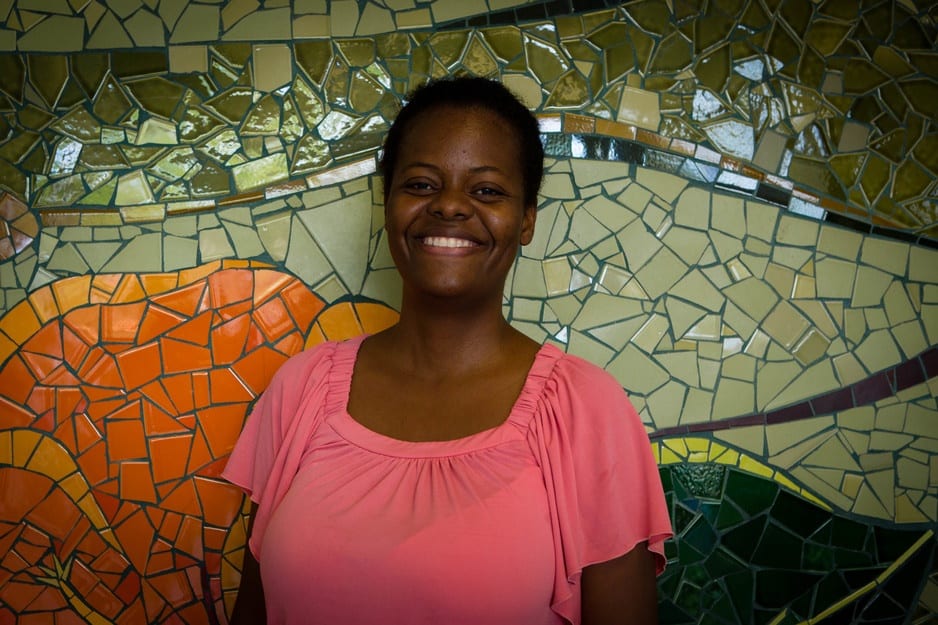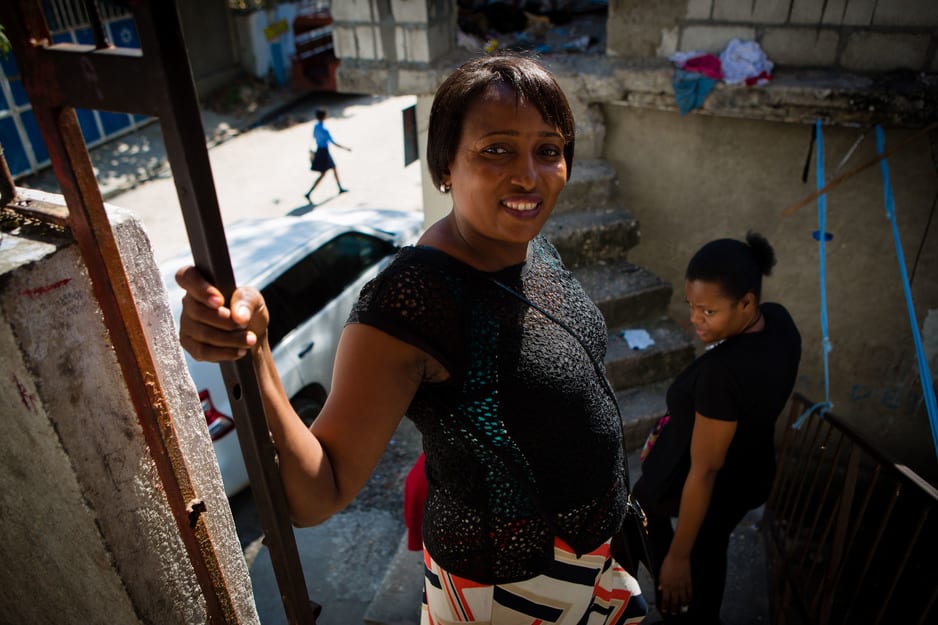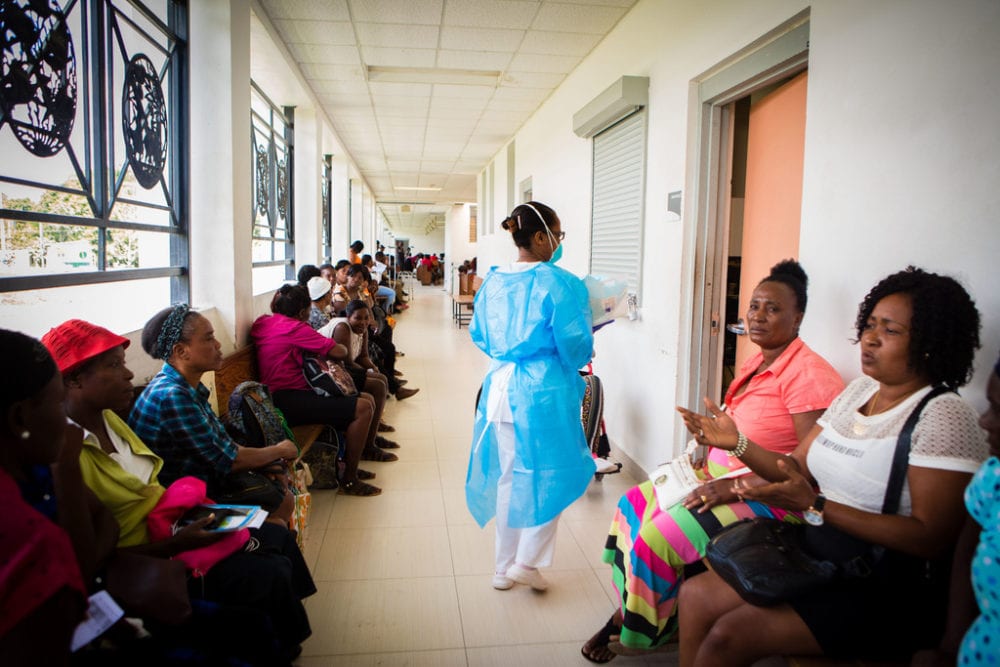The Social Worker Extraordinaire Helping Breast Cancer Patients


Oldine Deshommes never has an empty office. The social worker is a go-to resource for every cancer patient passing through the double doors of the Roselene Jean Bosquet Center at University Hospital in Mirebalais, Haiti. Her role is to connect them with support and resources, which she always delivers with a broad smile and a warm hug.
Deshommes has worked with Zanmi Lasante, as Partners In Health is known in Haiti, for nearly 10 years, starting shortly after the devastating January 12 earthquake by providing psychosocial support to survivors living in temporary shelters in the capital of Port-au-Prince. She then transitioned to serving cancer patients at the PIH-supported Bon Sauveur Hospital in Cange before moving with the rest of PIH’s oncology team in 2013 to University Hospital in Mirebalais, where there are now three physicians, four nurses, and one psychologist meeting patients’ cancer care needs.
In 2018 alone, clinicians provided care to 569 patients at the oncology clinic at University Hospital in Mirebalais, treating everything from breast and cervical cancers to leukemia and gastrointestinal cancers. Deshommes surely met, and helped, the vast majority of those patients.
In honour of Breast Cancer Awareness Month, Deshommes reflects on her career as a social worker, shares the barriers cancer patients face in Haiti, and addresses what remains to be done to provide patients with the best care possible.
How did you get into social work?
From an early age, I was always available to listen, advise, and help family members and friends manage difficult situations. That’s why in the Faculty of Human Sciences at the State University of Haiti, I opted to study social work, a profession essentially of helping others. It’s about helping people use their own resources and community resources for their needs.
What are some barriers women face in accessing cancer care in Haiti?
The challenges within our health system in Haiti, the low economic level, and the low education levels of the majority of people living in Haiti are reasons why women who have breast cancer most often arrive at the hospital at an advanced stage of the disease.
Many stayed longer at home before going to the hospital for lack of money or lack of awareness. Others claim to have spent all their money on medical care before coming to University Hospital in Mirebalais. The care offered here is certainly free, but our patients come from all regions of the country. They therefore need money for transportation, food, and other daily expenses. Some patients miss their appointment at the hospital for lack of financial support.

A vast majority of the patients you support are battling breast cancer. Tell us what concerns they have, and how you help.
The majority of patients are or have been small traders, who during their illness have spent all their savings and have nothing left to continue the fight against cancer. Some receive financial help from their extended family or friends. But sometimes those people who help do not continue, because they become discouraged or lack money themselves. At University Hospital in Mirebalais, we give financial help to those who are in need. But many patients are in this situation, and we do not have much money to give this type of assistance, so it is not enough to help everyone.
Patients suffer because they can’t afford school fees for their young children. They are worried about their future in a country like Haiti, where there is not really a structure that can take care of these children.
And yet, we cannot stop thanking those who donate to our patients. In our oncology service at University Hospital in Mirebalais, prostheses and special bras are given to patients who have had a mastectomy. We know they are concerned about their physical appearance. We also give wigs and scarves to those who are in chemotherapy. These donations also contribute to the work we do to improve the quality of life of our breast cancer patients.
You facilitate group sessions for women battling breast cancer. What benefits do you see women gain from these sessions?
Support groups allow patients who are experiencing similar situations to get together for counselling and emotional support. Through these sessions, patients realize they are not the only ones to live this difficult experience. Some patients come out of their social isolation and make friends. The psychosocial team leading these groups sometimes gives information on cancer, treatments, and services offered at University Hospital, as well as general information about resources patients could use. We also hold psychoeducation sessions. These groups allow us to better understand and act on the overall suffering of cancer patients.
“It makes me think about what we can always do. Every minute counts.”
What have you learned from breast cancer patients over the years, especially those who are in palliative care?
In palliative care, the person often questions his life—what she had time to do or not. It makes me think about what we can always do. Every minute counts. Over time, patients taught me at least two lessons in life:
1) I understand how important it is to look after our relationships with others, especially those who are dear to us. Social support is very important in the management of palliative care patients.
2) Our love for those who are sick makes it sad to think about their imminent death, but can also give us the courage to plan what we can for their future and also to live serenely the last stage of life. I consider this a victory in the fight against cancer in palliative care.
Is there anything you wish you could do for your patients, but can’t, due to financial constraints?
We know that loved ones have an important place in the care of patients suffering from cancer, so we encourage them to accompany their sick parents to their appointments at the hospital. We try to give them psychosocial support, help them better understand cancer and its treatments, and organize special support groups for them. But it is difficult for us to accompany them as we would like. Because the majority of patients are themselves struggling to find money for transportation, they find it difficult to pay transportation for another two or three people who would accompany them. If we would like caregivers to come to appointments too, we would often need to help with transportation, but we do not have enough money to always do it.

What other resources exist in Haiti to support cancer patients and their families?
In Haiti, there are not really community-based social support organizations to help cancer patients. The Haitian state does not have a strong policy or health system to care for cancer, a disease that causes a lot of deaths and can also have repercussions on patients’ socioeconomic situation. Patients often cannot work during treatment, which leads to the impoverishment of families, children who are forced to leave school, or children whose mental health is affected by the loss of their parents. Sometimes this leads to juvenile delinquency.
At University Hospital, when a patient’s needs cannot be met, we would like to be able to connect her to other social support community organizations. We make referrals to a cancer support group based in Port-au-Prince, but it cannot always meet patients’ needs. We would like to have more resources to help patients and more places to which we can refer them and their loved ones who are suffering from cancer.
Article originally posted on pih.org



